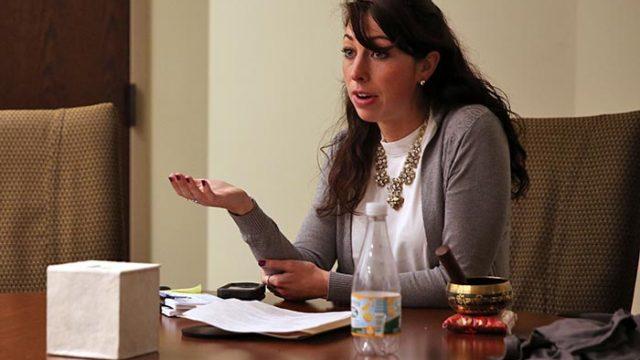A group of five students escaped the commotion of Boston College life and found solace in a body scan meditation hosted by the Office of Health Promotion on Tuesday afternoon.
The meeting was the first of OHP’s weekly mindfulness drop-in sessions this year, a program established last April with the goal of teaching students techniques to control their stress and providing them with time to reflect on their mental states.
“This is something that we saw as important to our general health education and a way for students to practice mindfulness techniques in their day to day journey at BC,” said Makayla Davis, assistant director of OHP and the host of the drop-in session. “It’s a way to teach students to be present and how to calm their minds in their busy day-to-day lives.”
OHP started its mindfulness drop-in sessions in order to provide a quicker and noncommittal way for students to learn about mindfulness and stress management skills.
“Instead of attending an hour-long program, why not a good, quick, 15-minute drop-in session that students can practice and learn a skill?” Davis said.
The program has seen success since its establishment last year, with several students returning for more than one session, Davis said.
“We welcome all students, and they can come to one session, or they can come to all of them.”
—Makayla Davis, assistant director of OHP and the host of the drop-in session
Depending on the time of year, OHP has tailored the sessions’ approaches to fit students’ need. During finals week last spring, the drop-in sessions involved visualization and anxiety reduction techniques that specifically targeted stress related to exams. The session’s aim was to relieve test anxiety for students during a high-stress period.
Although the University has seen a recent rise in the number of students seeking counseling services, OHP’s mindfulness drop-in sessions are independent of University Counseling Services and do not represent a response to this spike. Instead, Davis said, the program is a natural progression of her office’s mission. OHP currently employs 60 undergraduate volunteer health coaches, as well as professional staff.
“This [program] was something that we saw as important to our general health education,” Davis said. “It was founded purely out of our goal as a health promotion office, in really working on education and prevention, and teaching skills to help students have those coping strategies and techniques.”
The weekly sessions stem from OHP’s “Be Mindful, Be Chill” program, which is a more formal group session that teaches similar mindfulness techniques. OHP offers two other related programs as well: “Be Positive, Be Chill,” which teaches students how to change negative thoughts to positive energy, and “Stress and the Brain,” which informs students about how stress impacts the body. Stress and the Brain will be available in the spring. These programs make up the OHP’s larger health initiative called “iChill,” which seeks to provide students with greater stress management resources and skills.
In addition to iChill, OHP offers programs including “iNourish,” which involves instruction on healthy eating habits, “iPlan,” which is centered around time management, and “iChoose,” a program that offers alcohol education to students. These four programs together make up OHP’s “iHealth” initiative, and can be requested by any student group. OHP also offers individual counseling programs in which students can meet one-on-one with a health coach and create personal plans having to do with stress, time management, and eating habits.
“We welcome all students, and they can come to one session, or they can come to all of them,” Davis said
Featured Image by Lucius Xuan / Heights Staff













